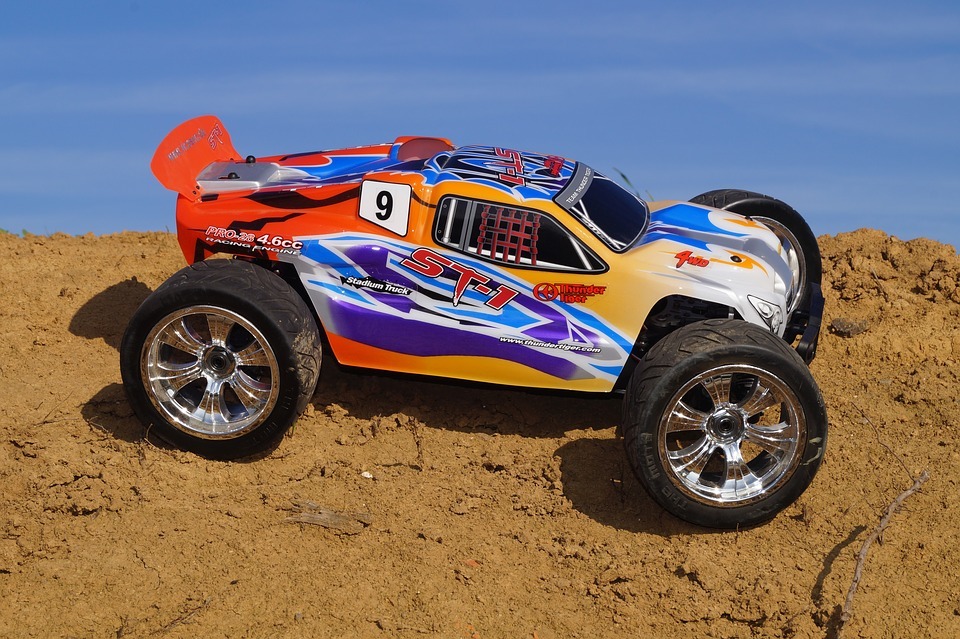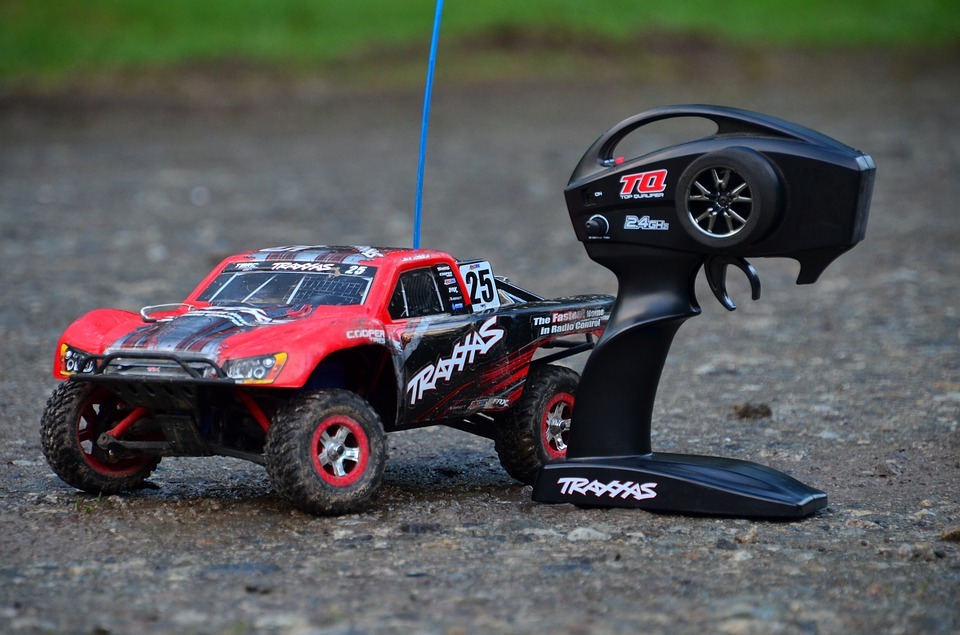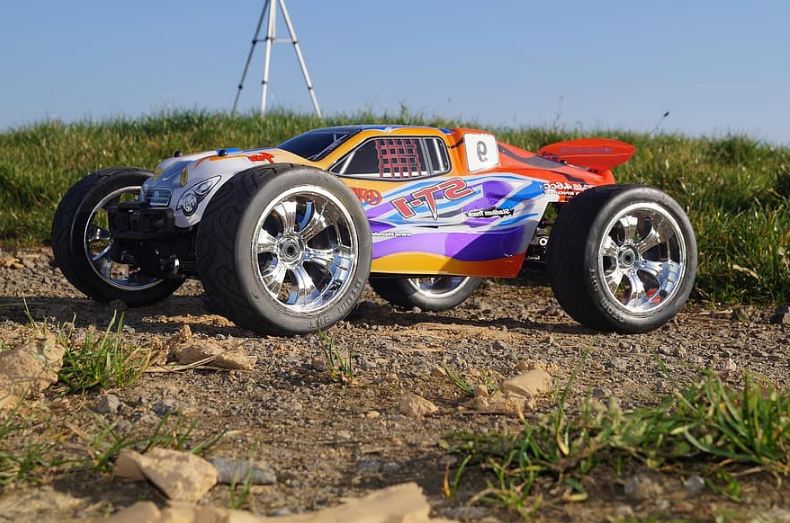What to Know About Off-Road and On-Road RC Cars
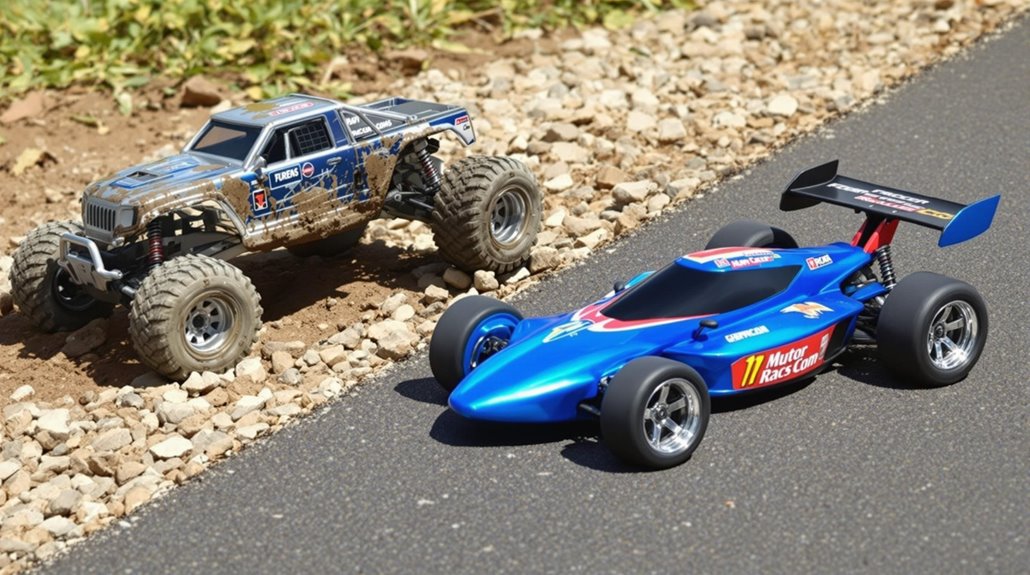
When choosing between off-road and on-road RC cars, it's crucial to understand their differences. On-road cars excel on paved surfaces, offering speed and quick handling, while off-road vehicles thrive on rugged terrains, focusing on durability and traction. Each type has unique performance metrics; on-road vehicles have shorter braking distances, and off-road cars require more space to stop. Remember to consider your intended use, the terrain you'll race on, and the specific features you want. There's much more to explore about maintenance, community engagement, and choosing the right model to enhance your RC experience.
Key Takeaways
- On-road RC cars are designed for speed on paved surfaces, while off-road vehicles excel in stability on rugged terrains like dirt and grass.
- Off-road vehicles are built with reinforced tires and durability features, while on-road cars prioritize lighter frames and quick handling.
- Performance varies significantly due to battery types, with lithium polymer batteries providing better acceleration compared to nitro options.
- Understanding the terrain suitability and braking distances is essential for choosing the right RC car for your intended use.
- Engaging with community forums and researching models can enhance your knowledge and help you make informed purchasing decisions.
Definition and Characteristics
When it comes to remote-controlled (RC) cars, you'll find two primary categories: on-road and off-road vehicles, each designed for specific environments. On-road cars are optimized for paved surfaces, focusing on speed and fuel efficiency. These vehicles feature lighter frames and smooth tires, which allow for quick acceleration and shorter braking distances, resulting in superior handling during turns.
In contrast, off-road vehicles prioritize durability and traction to conquer rugged terrain. They're built with knobby tires and reinforced structures, ideal for handling jumps and rough ground. However, their design means they're generally heavier, which can affect overall speed. While off-road cars excel in stability and durability, they typically require longer braking distances compared to their on-road counterparts.
The key differences between these two types significantly influence their performance characteristics. On-road cars thrive in smooth, fast environments, while off-road vehicles shine in challenging landscapes. Whether you're tearing down a racetrack or navigating a rocky path, understanding these characteristics helps you choose the right RC vehicle for your adventures. Additionally, for those interested in customization options, RC cars offer a range of aftermarket parts that allow enthusiasts to enhance performance and personalize their vehicles.
Performance Metrics
Performance metrics for RC cars reveal significant differences between on-road and off-road models that can impact your driving experience. On-road cars typically achieve higher top speeds and excel in quick acceleration on smooth surfaces. Their performance characteristics include shorter braking distances due to lighter weight and optimized design, allowing for better handling in turns. You'll notice how these vehicles maintain greater stability at high speeds, making them a favorite for racing enthusiasts.
On the other hand, off-road vehicles are designed for rugged terrain, prioritizing stability and performance over uneven surfaces. They require longer braking distances because of their added mass and the challenges presented by rough ground. While they may struggle with high-speed handling, off-road models shine when it comes to jumps and navigating obstacles.
When it comes to fuel efficiency, on-road RC cars generally perform better, as they're crafted for smooth driving conditions. In contrast, off-road vehicles tend to consume more energy due to their heavier build. Understanding these performance metrics helps you choose the right type of RC car based on your driving style and intended terrain. For those new to the hobby, selecting between an electric or nitro RC car can significantly affect performance and maintenance requirements.
Terrain Suitability
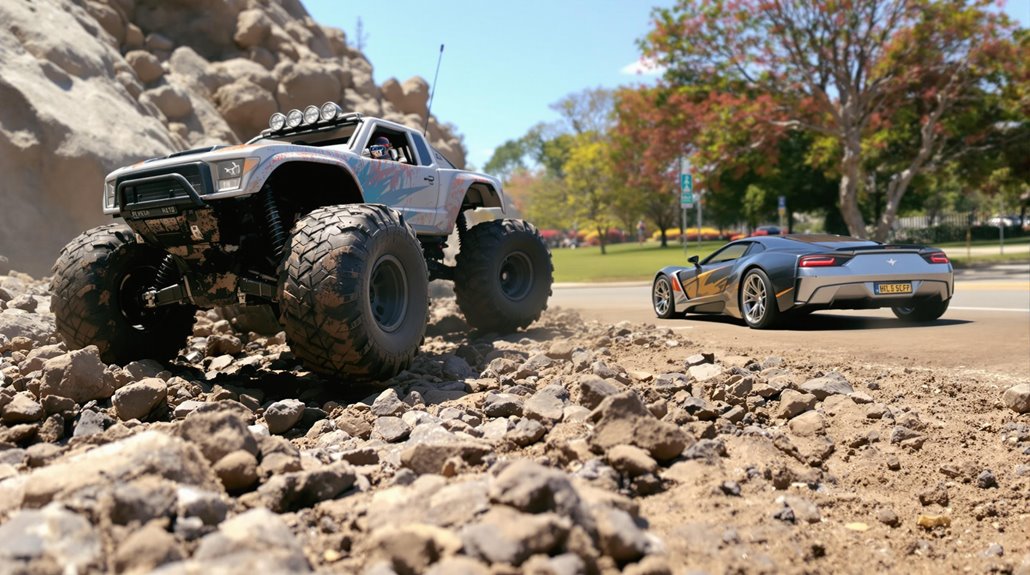
Choosing the right RC car for your adventures hinges on understanding terrain suitability. The type of surface you plan to conquer plays a crucial role in determining whether you should opt for off-road vehicles or on-road RC cars.
- Paved surfaces: Ideal for on-road RC cars, these vehicles excel in speed and handling, making them perfect for racing tracks and urban environments.
- Rugged terrains: Off-road vehicles shine here, designed to tackle dirt, grass, and uneven surfaces with ease.
- Durability: Off-road cars feature reinforced tires and robust components to handle tough environments, while on-road vehicles prioritize lighter builds for speed.
- Performance: On-road cars have shorter braking distances and better handling in turns, while off-road vehicles require more space to stop due to their weight.
- Versatility: Off-road vehicles allow you to explore a variety of outdoor settings, from trails to parks, enhancing your experience.
Knowing the terrain will enhance your RC car experience, ensuring you choose a vehicle that meets your adventure's demands. Whether you're racing on smooth tracks or navigating rough trails, understanding terrain suitability is key to maximizing performance. Traxxas, known for high-quality parts, ensures outstanding performance in both off-road and on-road RC cars.
User Experience and Safety
In the world of RC cars, user experience and safety are paramount, guiding your choice between off-road and on-road vehicles. Off-road vehicles are built with roll cages and skid plates to protect against obstacles, making them ideal for rugged terrains. You'll find the thrill of jumping and navigating rough surfaces engaging, enhancing your overall enjoyment. However, this excitement comes with a trade-off in standardized safety testing.
On-road cars, on the other hand, often incorporate advanced driver-assistance systems (ADAS), which improve safety during high-speed maneuvers. Their lighter weight and smoother design contribute to shorter braking distances, making them safer in urban environments. The user experience with on-road vehicles mimics real-life driving, providing a stable ride that allows for confident handling.
While off-road vehicles emphasize durability in challenging conditions, on-road cars undergo rigorous crash testing, ensuring a higher level of safety. Understanding RC car scaling is important when choosing between these types, as the size can affect handling and performance. Ultimately, your choice hinges on what you prioritize: the rugged adventure of off-road driving or the speed and stability of on-road cars. Both options offer unique experiences, but understanding their safety features will help you make an informed decision.
Durability and Market Trends
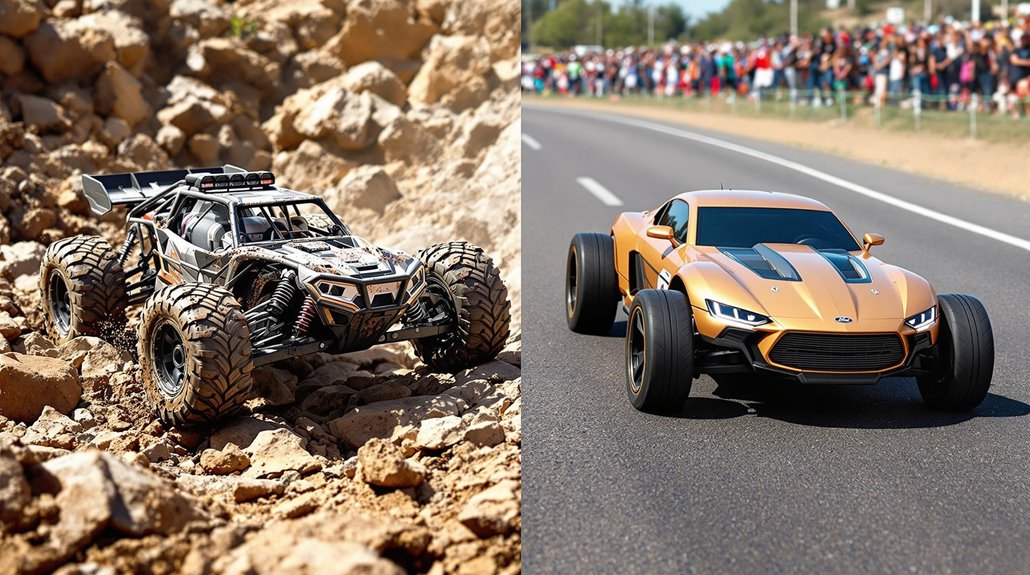
User experience and safety play significant roles in your RC car decisions, but durability and market trends also shape your options. When you're considering whether to go for off-road or on-road vehicles, understanding their differences in durability and current market trends is essential.
- Off-road vehicles are built to withstand rugged terrains, featuring reinforced structures that handle impacts from jumps and rough landings.
- Recent market trends show a surge in popularity for off-road vehicles, fueled by a growing interest in outdoor recreation like trail riding and rock crawling.
- On-road vehicles often come with higher maintenance costs, especially those tailored for competitive racing, due to frequent tire replacements.
- Versatile designs that blend both on-road and off-road capabilities, like SUVs and crossovers, are gaining traction in the market.
- Technological advancements are enhancing durability and performance across both categories, with on-road vehicles focusing on electric and hybrid technologies for better efficiency.
- Electric RC cars, powered by brushless motors, offer enhanced performance and efficiency for on-road racing enthusiasts.
Recommendations for Enthusiasts
What makes a great RC car for enthusiasts? If you're into on-road cars, you can't go wrong with the HPI RS4 or the Associated NTC3+; both excel in performance and durability. For those who prefer off-road vehicles, consider investing in a monster truck for its versatility and ruggedness. If you're eyeing 1/8 scale GT cars, check out the Ofna DM-1 and Kyosho Inferno GT—they're perfect for some fun parking lot bashing.
When it comes to powering your Electric RC cars, opting for brushless motors will give you faster acceleration and lower maintenance costs compared to nitro options. Plus, using quality Lithium Polymer batteries will enhance your performance and provide longer run times, which every enthusiast appreciates. It's important to take into account the battery life impacts playtime and performance when choosing an RC car.
Before making a purchase, engage with community forums and research similar models to ensure you're well-informed. This approach not only enriches your learning experience but also helps you find the perfect fit for your needs. By considering these recommendations, you'll be ready to enjoy your RC hobby to the fullest. Happy racing!

